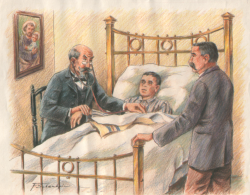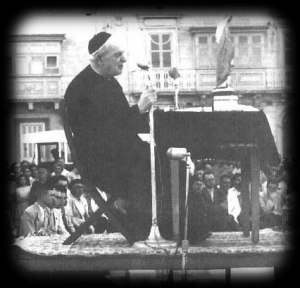Read online
Fr Preca - The Manner of a Saintly Priest
Adaptation of a script written by Abel Giglio
A translation of ‘Il-bixra ta’ Dun Ġorġ’ – an article written in Maltese giving a close up look at the person of the founder by a member who was very close to him. This script was also used for the production of the video feature that bears the same name.
Abel Giglio
Fr George was a tall man. He walked in long but measured steps; slightly inclined forwards; his eyes usually looking to the ground except when crossing the road, talking to people or teaching. He never appeared as he was in a rush and every time he wandered along the streets, he gave the impression that he was heading somewhere to do good. It wouldn’t cross your mind that he was going somewhere to relax, or that he was just going for a walk but more likely that he was going to give a talk somewhere, or visit a sick person or to one of the SDC centres, the Society he started, to teach children and members.
He was totally against thoughtlessness, agitation and unnecessary work. “Everything in its time and at the right moment,” he often stated, and the principle that guided him was that in Latin, ‘Age quod agis’, ‘Focus on the task at hand,’ – a principle which he taught to so many people. Although he didn’t like rushing, he always managed to do a lot of good through giving advice, preaching to all sorts of people, opening new SDC centres, spending time on the large body of his writings, while still finding enough time to celebrate mass and taking his time to pray the liturgy of the hours.
Fr George led an orderly life, although not necessarily an organised one. He showed a human effort in what he did, but above all he was docile to inspirations by the Holy Spirit.
Fr George was a sickly young man. He often repeated that when he was a young boy he was ‘like a feeble hen’ (as the Maltese saying goes) and that when playing sports and choosing children to form two teams, he was always the last one to be picked and that due to the fact that his mates knew he was not able to contribute or show any skills, they would say, ‘You can have George for nothing!’ as if saying that with or without him nothing extra would be achieved.
Near the time he was to be ordained a priest, George fell seriously ill with a lung infection. Naturally, his father, Vincent, sent for the best practitioner of the time, professor Enrico Meli. This professor however didn’t raise any hopes and said to Mr Preca, ‘He will certainly die – one of his lungs has already gone. Do not bother spending any money to buy things he needs for his priestly ordination – no chalice, no chasuble.’
The world had separated him even from his own health when he was at the peak of his life and his ideal. But he was already able to put his trust in the heaveanly Father in everything, and he had cast his sight and fixed his look for a long time on the large image of St Joseph looking after Jesus. Fr George himself used to say that he could not understand how he was able to gather enough strength to attend his own ordination to the priesthood.
He often found it hurtful – and he often talked about this – when at the time he started setting up his SDC Society, some people used to say, ‘He’s just recovered from an illness and he’s out of his mind,’ and they used to gesture with three fingers next to the head as if saying he was insane. He used to say to me, ‘This was a very serious concern. If people start to consider you as insane, it means that whatever you do you couldn’t be trusted or believed.’
I used to see him going on foot from his house on Ħamrun High Street to the Institute of Fra Diego where he used to go to say mass, around the block from where he lived. He always said to the altar boy serving mass to sit, in case mass took long and he started to feel tired. After mass he used to see people who wanted to talk to him. This usually took the whole morning.
In his younger years he chose to go on foot to anywhere he wanted to go. Transport means were very limited then. If ever he was offered a ride, even if on a horse-drawn cart, he wouldn’t mind accepting the offer. When the tram was introduced on the islands of Malta he used it too and later he also travelled by bus with common folk. Many times on a Sunday afternoon, even in his later years, he used to come by bus to the Fleur-de-Lys SDC centre where I attended as a young lad. Often he found the place still closed so he just sat on the doorstep and waited until we arrived back from our weekly afternoon walk.
Towards the end of his life, he sometimes asked Tony Agius to drive him to the coast for some quiet time and to absorb himself looking at the wide open space of the blue sea, in front of which he used to repeat, ‘Great and wonderful are your works almighty God.’
His face was beautiful – a white face with a pinkish touch. His dark brown eyes were large; his hair cut short and with the tonsure circle cut that usually was slightly larger than that of other priests. He was not bald. He definately liked keeping his hair short due to the love he had for Jesus crowned with thorns – as he often suggested those who cared about their hair should also do.
His arms were long as were his legs too, but his fingers were impressively long and he frequently used them to illustrate his thoughts, particularly when he raised his hand and showing four fingers, he would loudly say, ‘Four days we’ve got on this earth!’ - a Maltese phrase that means a very short time. Or he would stand to bless all sorts of things: sweets, rosary beads, crucifixes and water; then he would touch whatever he was blessing with three fingers. Quite impressive too was when he held up three fingers in order for you to reply by holding up your forefinger – a non verbal profession of faith of the mystery of the Holy Trinity - one God in three Persons.
Fr George was a practical man as long as everything was kept modest and did not taint the soul. Once, a young newly ordained priest in a religious order was chosen to move abroad to further his studies and specialise in theology. He wanted to go to Fr George for a blessing and went dressed as a clergyman, something that no one dreamt of in those days. As he walked in he apologised for not wearing the religious habit. Fr George looked at him and said, ‘What does that matter? You’re very decent in your dress!’
I never remember him wearing a discoloured worn out cassock as some have suggested, and neither one with fake patches. I do know however, that he wrote that we should carry on using things as long as possible and that this is a sign of spiritual poverty, but I never saw him doing anything intentionally to appear to be poor.
He wore a pair of army shoes given to him by Victor Briffa Brincati who was on national service and who used to go to Fr George for confession. From the day he started using it, this pair of shoes never saw a lick of polish! His sister or Nellie Bartolo at times tried to take them when he was resting to give them a clean and a polish but he never let them do that.
I wish I was able to draw to give you an idea of the image in colour of the way our father George Preca looked; but I could only try scribbling in pen a few lines about this priest, so endearing in his manner. Those who didn’t know him might have thought that he was a man who did everything with precision, as other saints are often portrayed. I hardly know anyone else who was so humane, without any theatrics, with such transparency as was Fr George. Truly his looks and manner changed when he felt that inner communication of the spirit. He was one and the same person, but he was so close to God that he couldn’t be closer to others. He communicated with God so intensly that he became the easiest person to communicate with. He resembled God so closely that everyone looked for him to find out what God wanted to say to them. The spirit of God made the manner of Fr George more human.




Follow us on